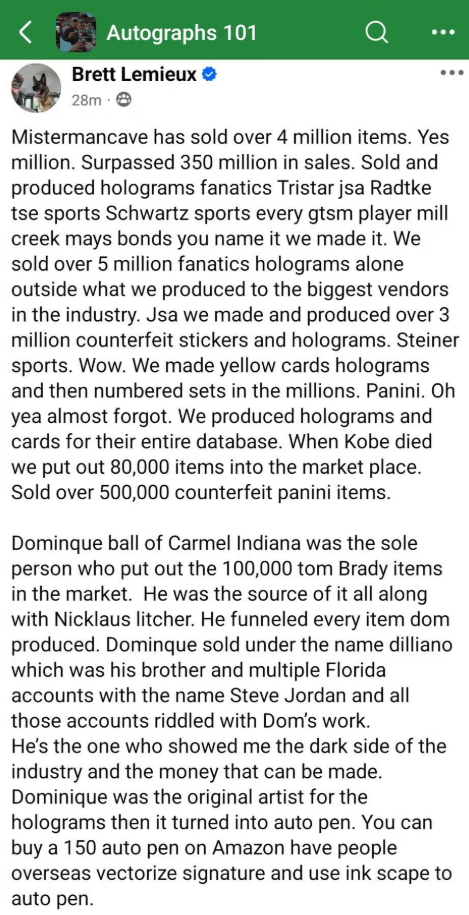Beneath the glossy veneer of the sports memorabilia world, where fandom meets feverish collecting, a scandal of epic proportions has unfolded, leaving a trail of doubt, deceit, and a deadly finale. At the heart of this sordid saga is Brett Lemieux, an autograph dealer whose name was once associated with prized relics of athletic glory, but is now synonymous with one of the biggest counterfeit operations in the nation’s history.
Lemieux, a man whose reputation in the collectibles realm preceded him, met a tragic end during a police raid at his Westfield residence. The investigation was the culmination of an intense probe into a sprawling counterfeit memorabilia scheme that sent shockwaves through the industry. While the Hamilton County Coroner’s Office has yet to formally declare his cause of death, initial reports from Westfield police suggest that Lemieux died by his own hand, collapsing under the pressure of the tumbling empire he had built on deception.
This scandal detonated with the sudden appearance of a confession post in the “Autographs 101” Facebook group, attributed to Lemieux himself. In a twist worthy of a crime thriller, he admitted to steering a counterfeit operation that produced over four million fake sports items, with staggering claims of $350 million in fraudulent sales. To collectors, dealers, and anyone who considered themselves aficionados of autographed memorabilia, this was not just a breach of trust—it was an earthquake that fractured the foundation of their passion.
Operating under the guise of “Mister Mancave,” a business that boasted about housing “the largest framed jersey inventory on the web,” Lemieux cunningly advertised a Columbus, Ohio storefront that never materialized beyond mere paperwork. A deeper dive into Mister Mancave’s existence reveals its fleeting incorporation in Indiana twice over a five-year span, a red flag now, hindsight painfully acknowledges.
Lemieux’s alleged digital declaration detailed a shocking strategy: counterfeiting the coveted hologram stickers. These stickers, issued by recognized authentication leaders such as Panini, Fanatics, and James Spence Authentics, are quintessential markers that dictate an item’s legitimacy and consequently, its value. After the tragic helicopter crash that claimed the life of NBA icon Kobe Bryant in 2020, Lemieux exploited the fervor surrounding Bryant’s memorabilia. He purportedly unleashed a deluge of fake Bryant items—80,000 strong—onto the market, each festooned with seemingly legitimate hologram stickers.
The counterfeit con extended beyond basketball into the realm of Major League Baseball. An Aaron Judge-signed baseball listed on Lemieux’s website, complete with a questionable Fanatics hologram, was priced tantalizingly low at $399—a far cry from the legitimate $699 price tag at verified dealers. This aggressive pricing initially attracted bargain-hunting collectors but later became a smoking gun as eyebrows were raised over such steep discounts supported by suspect holograms.
In the frenzied aftermath of these revelations, the autograph industry stands poised at the edge of a cliff. Fanatics, a linchpin in authentication, claims to have fortified its hologram technology two years prior in anticipation of just such foul play. They have doubled down on their resolve to purge the market of counterfeits, enlisting the expertise of former FBI operatives to shore up their defenses.
Skepticism greets some of Lemieux’s more audacious claims; one competitor sardonically dubbed the notion of $350 million in sales as “impossible.” Nevertheless, the ramifications of such an entrenched scheme are undeniable. Steve Grad, an authority on autograph authentication, warned that the increasing sophistication of forgery tactics makes differentiating the genuine from the counterfeit a daunting task. The reverberations of this case will echo for years, raising the stakes in the battle against fraud.
Insiders who’ve brushed against the dark underbelly of the industry are not entirely blindsided. Tales of Lemieux possessing signatures from athletes long withdrawn from public signings were whispered before. Now, as names from the periphery like Indiana’s Dominique Ball and Wisconsin’s Nickolas Litscher emerge in connection to this duplicity, denials are fervent, and legal actions loom on the horizon.
Lying scattered across this ill-gotten empire are the aliases under which Lemieux and his cronies allegedly operated, using brands like Ultimate Sports and All-American Authentics as conduits for counterfeit distribution.
As authorities dissect the tangled web and the hobby shop stands amid the debris, collectors are left clutching possibly fraudulent tokens of their enthusiasm. Deception has always shadowed this industry where passion blurs logical restraint. This scandal, like purloined signatures penned by fabricated hands, serves as a stark reminder of the industry’s vulnerabilities and the urgent need for vigilance and robust safeguards.
